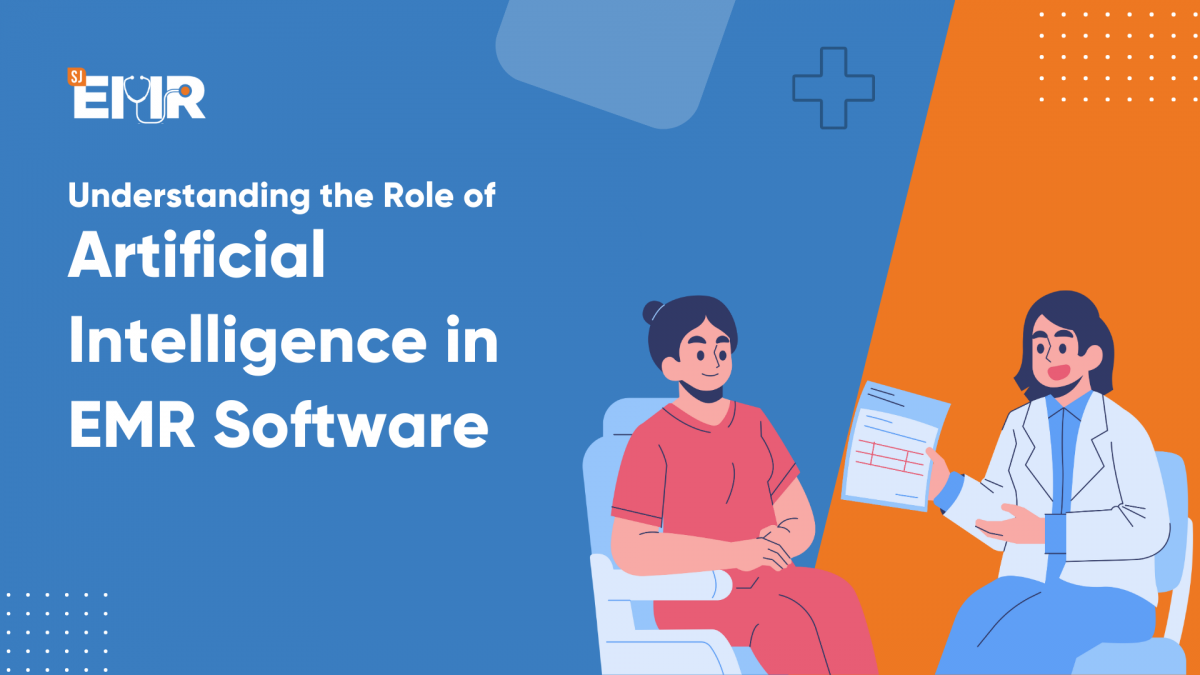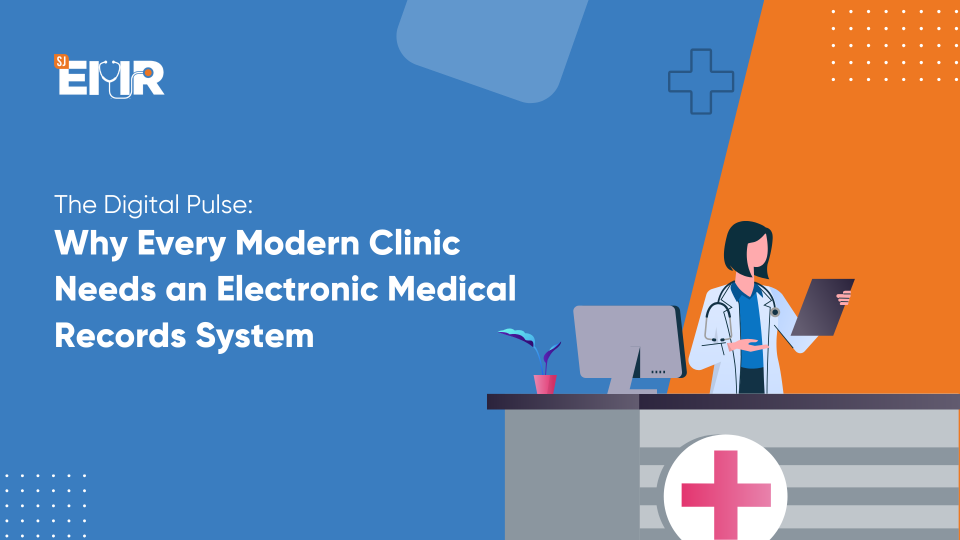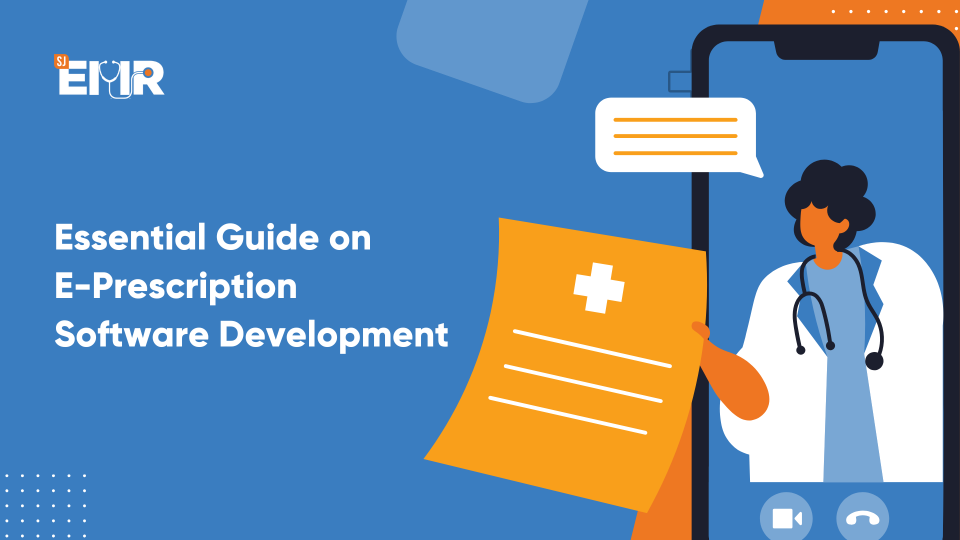Understanding the Role of Artificial Intelligence in EMR Software

Navigating the Digital Shift: Balancing EMR Use with Patient-Centered Care
December 21, 2023
Physician Burnout? Strategies to Maximize EMR Training & Support
May 2, 2024Understanding the Role of Artificial Intelligence in EMR Software
Artificial Intelligence in Electronic Health Records and Electronic Medical Records have brought up huge transformations in the way hospitals operate. Even better, AI and EMR systems are proving to be a force to reckon with!
Many hospitals are trying to work optimally and look after patients by using AI that understands and uses electronic medical records. AI features like Natural Language Processing (NLP), image recognition, and smart input suggestions greatly improve how doctors and nurses work, making it easier to manage patient records and improving overall efficiency. AI’s infusion into EMR systems is not just a step forward; it’s a leap toward a future of more personalized, efficient, and insightful healthcare services.
The Blend of AI-EMR
In 2023, the healthcare AI market was valued at $22.45 billion and is predicted to skyrocket to $208.2 billion by 2030, with a significant compound annual growth rate (CAGR) of 36.4%. This explosive growth is driven by the crucial necessity to improve outdated EMR workflows and extract valuable insights from past patient data.
All in all, AI-EMR promises 3 elements – speed, data sharing, and access. Healthcare professionals, IT specialists, and medical administrators are soon acknowledging this synergy enhances the capacity to deliver care that is not only reactive but also proactive and predictive.
Impact of AI on EMR: Improving Efficiency and Patient Care
Speedy Patient Record Management: Features like speech recognition and AI-driven data entry suggestions expedite the process of managing patient records, reducing errors, and increasing efficiency. This in turn helps in improving the patient experience of care.
Automated Administrative Tasks: Besides managing patient records, AI automates routine administrative processes, such as appointment scheduling and clinical documentation, enabling healthcare professionals to allocate more time toward direct patient care.
Enhanced Patient Care Quality: With administrative tasks virtual assistant, cohesive records, and AI-enabled treatment planning, enhanced patient care quality and consistency are significantly improved, ensuring better health outcomes.
Diagnostic Assistance: AI offers diagnostic imaging service and support with an accuracy rate soaring up to 98.7%, leveraging comprehensive patient data for prompt disease identification and tailored treatment plans.
Applications of AI in EMR Software
AI plays a pivotal role within EMR software, spanning diverse domains. Here are some applications of generative AI:
- Patient Records Management: AI streamlines data entry, enabling swift access to essential patient data for physicians while cutting down on management costs.
- Diagnostic Assistance: Physicians leverage AI-powered EHRs to swiftly interpret symptoms, medical images, and test results, expediting disease identification and treatment allocation.
- Personalized Treatment: AI algorithms discern patterns in symptoms and test outcomes, facilitating customized treatment plans for enhanced patient care.
Building a Strong Foundation for AI-Enhanced EMR Systems
Constructing a robust AI-integrated EMR system involves merging an AI engine with vital components like medical staff interfaces, patient record storage, and terminology services. This architecture, combined with integration into revenue cycle management and other systems, ensures access to up-to-date patient data for informed decision-making.
Noteworthy Features of Advanced AI-Driven EMR Software AI’s role in EMR software encompasses several key performance areas:
Enhanced Data Management
- AI powered apps excel in organizing, parsing, and interpreting data.
- Machine learning algorithms implemented within EMR systems can autonomously sift through mountains of health records, pinpointing trends and presenting data in user-friendly formats.
- This allows health professionals to make quicker, data-informed decisions, leading to improved patient outcomes.
Precision in Predictive Analytics
- Predictive healthcare analytics powered by AI can analyze historical and real-time data to forecast future health events.
- It provides a powerful tool for preemptive health strategies, enabling practitioners to provide timely interventions long before issues become acute, potentially revolutionizing preventive care approaches.
Automated Administrative Tasks
- The administrative burden on healthcare facilities is substantial.
- AI integration in EMR systems offers respite by automating mundane tasks like appointment scheduling, billing, and prescription management.
- Automated management tasks help reduce the administrative load and gives healthcare workers more time to focus on patient-centric responsibilities.
Diagnostic Accuracy
- Machine learning in EMR enhances accurate diagnostic labs precision, with AI algorithms demonstrating remarkable capabilities in reading and interpreting medical images and tests.
- Secure EMR data with AI ensures that these insights aid medical professionals without sacrificing patient privacy or data integrity.
Patient Engagement and Empowerment
- Patient empowerment network and engagement are pivotal to healthcare outcomes.
- AI empowers patients to take an active role in their health journey.
- Tools like chatbots, personalized health insights, and real-time health monitoring foster a participative approach, making patients and caregivers partners in the care process.
Solidifying EMR Data Security
- With the surge in digital health information, securing patient data is critical.
- AI not only augments EMR software with advanced encryption and access controls but also continuously monitors systems for potential threats, ensuring compliance with the highest standards of data protection.
Advanced EMRs leverage AI through:
- Natural Language Processing (NLP): Simplifying patient record creation via voice command interpretation.
- Clinical Data Extraction: AI-driven Optical Character Recognition (OCR) processes unstructured text, associating it with standardized codes.
- Text-to-Speech Capability: AI assists by audibly reading patient records, minimizing errors in prescriptions and clinical notes.
- Diagnostic Functionality: AI interprets lab results and medical images, alerting physicians to potential high-risk conditions.
- Physician Decision Support: AI personalizes treatment plans and suggests medication alternatives considering allergies or health risks.
- Telemedicine Appointment Planning: AI helps in scheduling follow-up appointments and sending patient reminders.
- Billing: AI efficiently manages care data and billing reports.
Market Growth and Advancements
The evolution of AI in EMR software goes beyond numbers; it signifies substantial progress in healthcare delivery, paving the way for market revolution technology and a transformative shift in patient care and operational efficiency.
Empowering Healthcare Professionals
AI integration in EMR software equips healthcare professionals with invaluable tools for patient care, administrative tasks, and data analysis, enhancing accuracy and speed.
AI-Driven Diagnostic Precision
AI’s application in diagnostics marks a significant leap in precision medicine, aiding early disease identification and tailored treatment plans.
Tailored EMR Solutions
Customized AI-powered EMR medical software solutions streamline operations, improve patient engagement, and enhance clinical decision-making.
Challenges and Opportunities
Types of challenges in AI implementation revolve around data availability and quality. Bias in data models risks unequal healthcare outcomes.
Future Prospects of AI in Healthcare
Despite challenges, the future of Artificial Intelligence in healthcare promises predictive healthcare solutions, revolutionizing disease diagnosis, personalized treatment, and efficient medical workflows.
The integration of AI in EMR software signifies a remarkable leap in healthcare, promising a future where technology transforms healthcare delivery.
AI-driven EMR systems are transformative tools shaping a more efficient and patient-centric healthcare landscape. As AI evolves, it’s crucial to harness its potential for an equitable healthcare ecosystem.




